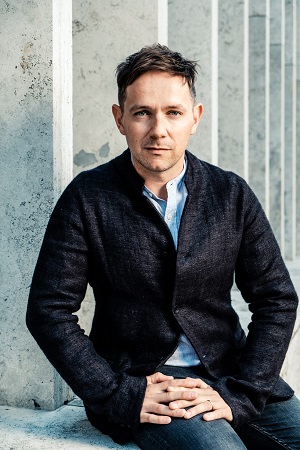Muhly’s Old Bones adopts an idiosyncratic angle from which to
reflect upon ‘Time’. Heard here in a new arrangement, conducted by the
composer, for harp, celeste and string quartet, the text (by Richard
Buckley, Philippa Langley and Guto’r Glyn) narrates the discovery and
exhumation of the bones of Richard III in a car park in Leicester in 2012.
A fragmented texture suffused with the cello’s pizzicato energy conjures
the excitement of detection and revelation - “They dug in that spot, and
the leg bones were revealed”. Davies’ composure and narrative focus drew us
into the significance of the unearthing, and we soon became as compelled as
the onlookers whose transfixed gaze is suggested by the harp’s oscillations
and the repetitions of the viola’s melody. The fusion of past and present
is embodied in the text itself, with third-person narration from the
perspective of the present juxtaposed with first-person observation and
reflection from the medieval past. The participant’s resonant announcement,
“King Henry won the day”, was celebrated by the assertive lower strings,
while the strange, disturbing feelings experienced by the modern-day
‘archaeologist’, “I am standing on Richard’s grave”, were evoked by
churning, twisting harmonies. Slowly rising from a sustained pianissimo pause, the dead King himself seemed to reclaim life,
“Now you can understand me”, “I’m ready”, the clarity and strength of
Davies’ vocal exclamation suggesting the ghostly compulsion to speak from
the grave as well as the madness of the modern-day observer: “Everyone else
was looking at old bones, and I was seeing the man.”
Muhly’s Clear Music for cello, harp and celeste also unites
present and past, being thematically based upon an early choral work by
John Taverner, Mater Christi Sanctissima. Unfolding an eloquent
opening melody, cellist Sébastien van Kuikj fell from a beautiful
high-lying opening to richer, heavier grains of the lower strings, while
the entry of the harp and celeste conjured the luminous spaciousness of
Renaissance choral polyphony and the towering cathedrals that such music
evokes in musical form. Motion for clarinet, piano and quartet
similarly builds upon a Renaissance fragment, from Orlando Gibbons’ verse
anthem See, see the Word, and the instrumentalists ranged with a
rapidly accelerating sweep through vivid terrain.
Interweaved between old and new were instrumental works from the
late-nineteenth century. Pianist John Reid opening the concert with the
quietly breathing pulse of Satie’s Third Gymnopédie while
harpist Sally Price conjured first heavenly light and air, and then ripples
of colour, in Debussy’s Danse Sacrée et Danse Profane.
Against the sensitive nuance of the piano accompaniment and the low
silkiness of Hélèle Clément’s viola obbligato, Davies worked hard to
communicate the yearning and fulfilment of Brahms’ Gestillte Sehnsucht (Assuaged Longing) but while there was firm
resoluteness and a relaxed power the countertenor struggled to convey the
Straussian passion which infuses this lied.
Two works by Thomas Adès made the strongest impression. Written when the
composer was just eighteen-years-old, The Lover in Winter (1989)
is a delicate miniature song-cycle whose Latin texts speak of the warmth
with which love can assuage and transform the cold, bleak season. At the
start, the strangeness and menace of this winter world is evoked by the
unsettling intervals of the voice’s descending scale, ‘Iam nocetteneris’
(Now the cold harms what is tender). Here, Davies’ pure sound was a shining
ray of wintry sunlight, while in the third song, ‘Modo figescit quidquid
est’ (Soon all that exists grows cold), a beautiful, blanched tone captured
the frozen immobility of the landscape, cracking icicles sparkling in the
piano accompaniment. The fire of the lover’s kisses surged through the
wavering vocal line at the opening of the final song, ‘Nutritur ignis
osculo’, while the fragmentation of text and melody at the close conveyed a
quasi-transcendental force: ‘nec est in toto seculo plus numinis’ (there is
not in all our age more of the holy power).
Adès’ mysterious Four Quarters (2010) was brilliantly played by
the four string players from the Aurora Orchestra. At the start,
‘Nightfalls’ opened up vast vistas of time and space, as high and low lines
wove an ethereal web. The rhythmic displacements of ‘Morning Dew’ were
skilfully controlled, accents pointedly placed, while in ‘Days’ the
instrumental voices piled upon one another creating thick textures and
tones of lovely colour, underpinned by the shapely cello phrases. The
wildest wanderings conjured by the fiendishly complex 25/16 time-signature
of ‘The Twenty-fifth Hour’, representing time spilling beyond the clock,
did not ruffle the composure established by Alex Wood’s serene harmonics at
the start, against the viola’s brushed chords and the cello’s gentle
pizzicato.
Adès’ cycle evokes a tradition of English song stretching back to the
Middle Ages and Renaissance, and the recital fittingly closed with Muhly’s
arrangement - for an ensemble comprising all the present musicians - of
John Dowland’s beautiful lute song, Time Stands Still. Now,
Davies’ voice seemed somehow ‘released’, more freely expressive than
previously, hovering above and then nestling gently into the muted strings’
cadential consonances. Viola and cello echoed and intertwined with the
vocal phrases, while the contrasting harp colour seemed to embody the
innate rhetoric and inner debate of the lyrics: ‘If bloudlesse envie say,
dutie hath no desert,/Dutie replies that envie knows her selfe his
faithfull heart.’
The text of Dowland’s song, which was published in 1603, is laden with
emblems which suggest that the lyrics are a panegyric to Queen Elizabeth I
- fittingly so, for, looking ahead, if at Kings Place Time will shortly
come to a point of rest and silence, then
Venus
is soon to be awoken and given voice.
Claire Seymour
Iestyn Davies (countertenor), Sally Pryce (harp), John Reid
(piano/celeste), Principal Players of Aurora Orchestra
Satie - Gymnopédie No.3; Thomas Adès -The Lover in Winter; Nico Muhly - Clear Music; Debussy -Danse Sacrée et Danse profane; Brahms - Gestillte Sehnsucht; Muhly - Old Bones (world premiere of
new arrangement), Motion; Adès - The Four Quarters;
Dowland (arr. Muhly) Time Stands Still
Kings Place, London; Friday 23th November 2018.
